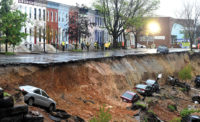Legal
US Court Disputes $1.8B AECOM Damage Award in ‘Remarkable Fraud’ Suit

A federal appeals court has thrown out a $1.8-billion award granted by a lower court three years ago to an AECOM unit in a bizarre legal battle involving a Nevada company that claimed to have won multiple contracts using the name of Morrison Knudsen—the former well-known Boise-based construction contractor that was sold in 1996, and through acquisitions, became part of design-build giant AECOM in 2014.
The appellate judges did not alter the lower court’s injunction halting use of the fake MK name in a long-running internet manipulation, but they ruled March 24 that the award was excessive.
The Nevada company claimed in press releases that it received three awards totaling $1.8 billion from the U.S. Environmental Protection Agency, U.S. Bureau of Land Management, Blackstone Mining group and the Indonesian Infrastructure Partnership in a “remarkable fraud to usurp the identity and goodwill of Morrison Knudsen Corp.,” AECOM said in its 2017 U.S. district court lawsuit.
MK was incorporated into the parent as AECOM Energy & Construction Inc.
To win the awards, the Nevada company “falsified corporate records, submitted false statements to both federal and state government agencies” and created a website on which it claimed MK’s history since 1912 and its well-known construction projects as its own. The company's address was a United Parcel Service facility in Henderson, Nev., the lawsuit contends.
“In 2008, unbeknownst to MK, defendants began what would become an intricate series of frauds designed to trade off, and indeed take over, the MK identity,” the suit says.
False Statements
Through a stated address in Los Angeles, company officials filed required government reports changing names of unrelated companies to the MK brand and submitted other reports for years to state officials, claiming approvals of a board of directors, "under penalty of perjury," the suit contends.
The filing contends that the defendants, which include five named individuals, took over Morrison-Knudsen Services, an affiliate of the former contractor that was incorporated in 1982 but dissolved in 2002. Defendant Todd Hale, iisted as company "president," revived the company, falsely claiming to Nevada authorities that he had board authority to do so.
“Defendants similarly took over another dissolved Nevada affiliate of MK, Morrison Knudsen Corp. of Viet Nam,” the AECOM lawsuit says. Defendants also changed the name of their existing company, E Planet Communications, to Morrison Knudsen International in 2016. Westland Petroleum Corp., a defunct company, also was renamed Morrison Knudsen in 2016.
AECOM called the company’s use of domain name www.morrison-knudsen.com “cyberpiracy.” Its suit contends the false MK site would show up "at or near the top" of searches of the Morrison Knudsen name and that Wikipedia's refrenc3e is to the fake site.
Through false statements to the U.S. Patent & Trademark Office changing the company address from Boise to Los Angeles, defendants "effectively then had control of MK's trademark registrations," according to the suit. The office acknowledged defendants' firm as "rightful owners" of MK trademarks for work in as a general contractor on public and private sector projects including dam, utility, transportation and industrial facilities.
The falsified website also claimed the fake MK could take "equity positions in a variety of projects" and back projects with "equipment lend/lease and financing."
Cease and Desist
The design-build firm sent a cease and desist letter to the Nevada company, accusing it of attempting to trade on MK’s goodwill, “the goodwill that rightly belongs to AECOM,” its lawsuit says. The parent asked the court to enjoin defendants' company from further use of MK’s name, trademarks and corporate records.
In November 2018, the federal district court awarded AECOM $1.8 billion in damages and permanently enjoined the Nevada company from claiming it is Morrison Knudsen Corp. or that its products and services originate from or have any relation to MK or from using the MK logo or any name or logo similar to Morrison Knudsen.
In ordering the lower court to reconsider the award total, the appeals court said “AECOM has failed to show that it suffered an ‘injury in fact,” although it agreed that AECOM is the entity that “always owned and still owns the MK property.”
The appeals court said while generally AECOM would be entitled to a monetary remedy, in this case AECOM failed to show any revenue earned by the rogue company or that defendants had started work under any claimed construction contracts or proved they were able to undertake their construction.
But the court did say that since defendants failed to provide reliable evidence of their profits or costs, the lower court could consider a “discovery sanction” if AECOM seeks such relief.
Separately, Judge Michelle Friedland, one of three ruling, disagreed. She said that the lower court’s damage amount was “within the range of options available for the court to consider," opining that defendants "stonewalled AECOM's every effort to ascertain information about their finances."
Attorneys for the defendants could not be reached.
A spokesman for AECOM did not respond by press time to an ENR query on the ruling.




